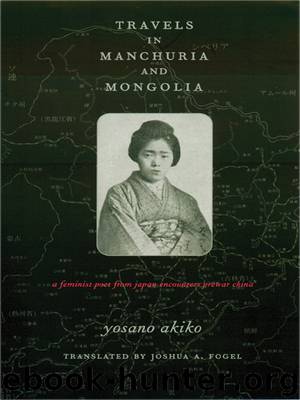Travels in Manchuria and Mongolia by Yosano Akiko; Fogel Joshua;

Author:Yosano, Akiko; Fogel, Joshua;
Language: eng
Format: epub
Tags: Literary Criticism/Asian/General
Publisher: Columbia University Press
Published: 2012-01-12T16:00:00+00:00
Walking around the streets of Taonan, we saw a Chinese rural theater in an empty lot in front of the local Guandi Temple.15 It struck me as precisely at the level of festival music one sees in rituals in the environs of Tokyo; even the shape of the tent they worked from was similar. I don’t know what this theater was called, but two military commanders faced each other on a table and were fighting over something. Glasses were thrown. Their lines were delivered in verse. We had planned to visit Beijing and take in some theater there, but those plans had been abandoned, so I was happy to have had this glimpse even of rural theater. I did, though, feel quite strange when crowds of Chinese people and Chinese troops were staring at me in my Western dress.
Originally, the reason that Mongolians called this place shaajagai modu had to do with the fact that there was one old elm tree there oddly in the sand, and it was the goal in transport across the plain. Thus, they used the Mongolian word shaajagai modu, meaning elm tree, as the local place name. Literally translated it would mean “magpie tree,” as the Mongolians dubbed this elm a tree upon which magpies alighted. Until recently the tree was flourishing, but it has now died and, as a remembrance, is regarded as sacred. They have built a wall around it to prevent people from approaching too closely. I peeped in at the dead tree from a crevice in the wall. A noted sight here, it is featured on a picture postcard, too.
The Taor River flows directly in front of one of the gates to the city. One can see the greenery of low willow trees and summer grass from its shore. The Nen River [length: 425 miles] begins to the southwest of Mount Yilehuli in the great Xing’an range which forms the border with Outer Mongolia, and then flows to the southeast, north of Mergen [C. Moliugen] and west of Qiqihar. It then enters the terrain of the Dörbed [C. Du’erbodu] tribe of Inner Mongolia, flows to the southeast as far as Sanjiangkou, and then meets up with the Sungari River. One of its tributaries is the Taor River. I was reminded of a line from a poem, Congjun xing (Travels with the Army), by the Tangperiod poet Wang Changling:
Download
This site does not store any files on its server. We only index and link to content provided by other sites. Please contact the content providers to delete copyright contents if any and email us, we'll remove relevant links or contents immediately.
Cecilia; Or, Memoirs of an Heiress — Volume 3 by Fanny Burney(31459)
Cecilia; Or, Memoirs of an Heiress — Volume 2 by Fanny Burney(31409)
Fanny Burney by Claire Harman(26244)
We're Going to Need More Wine by Gabrielle Union(18636)
Plagued by Fire by Paul Hendrickson(17113)
Cat's cradle by Kurt Vonnegut(14763)
All the Missing Girls by Megan Miranda(14749)
Bombshells: Glamour Girls of a Lifetime by Sullivan Steve(13689)
Leonardo da Vinci by Walter Isaacson(12807)
4 3 2 1: A Novel by Paul Auster(11794)
For the Love of Europe by Rick Steves(11531)
Adultolescence by Gabbie Hanna(8591)
The remains of the day by Kazuo Ishiguro(8399)
Note to Self by Connor Franta(7453)
Diary of a Player by Brad Paisley(7270)
Giovanni's Room by James Baldwin(6814)
What Does This Button Do? by Bruce Dickinson(5933)
Born a Crime by Trevor Noah(5097)
Ego Is the Enemy by Ryan Holiday(4960)
